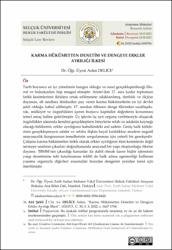Karma Hükümetten Denetim ve Dengeye Erkler Ayrılığı İlkesi
Künye
DELİCE, Aslan. “Karma Hükümetten Denetim ve Dengeye Erkler Ayrılığı İlkesi”. Selçuk Üniversitesi Hukuk Fakültesi Dergisi, 30. 3 (2022): 1667-1704.Özet
Tarih boyunca en iyi yönetimin hangisi olduğu ve nasıl gerçekleştirileceği filo-zof ve hukukçuları hep meşgul etmiştir. Aristo’dan 17. asra kadar toplumun farklı kesimlerinin iktidara ortak edilmesine odaklanılmış, ılımlılık ve ölçüye dayanan, alt sınıflara iktidardan pay veren karma hükümetlerin en iyi devlet şekli olduğu kabul edilmiştir. 17. asırdan itibaren denge fikrinden uzaklaşıla-rak, mülkiyet ve özgürlükleri içeren burjuva kapitalist değerlerin korunması temel amaç haline getirilmiştir. Üç işlevin üç ayrı organa verilmesiyle oluşacak özgürlükler alanında kendini gerçekleştiren bireylerin refah ve adaletin kaynağı olacağı beklentisi, erkler ayrılığının kabulündeki asıl saiktir. Geniş halk kitlele-rinin gerçekleşmeyen adalet ve refaha ilişkin hayal kırıklıkları modern negatif anayasacılık kurgusunun temellerinin sorgulanması için yeterli bir gerekçedir. Çalışma karma hükümetten farklı olarak erkler ayrılığının tüm kesimlerin değil sermaye sınıfının çıkarları doğrultusunda anayasal bir yapı oluşturduğu fikrine dayanır. TBMM’nin çıkardığı kanunlar da dahil olmak üzere hiçbir işleminin yargı denetimine tabi tutulmaması teklifi de halk adına egemenliği kullanan yasama organıyla diğerleri arasındaki bozulan dengenin yeniden tesisi için önerilmiştir. Philosophers and lawyers have always been occupied with the best administration and how it will be implemented throughout history. From Ar-istotle to the 17th century, the focus was on the aim of making different seg-ments of society a partner in power. Mixed governments, based on moderation and temperance, and giving a share of power to the lower classes, were con-sidered the best form of government. Since the 17th century, the idea of bal-ance has been abandoned and the protection of bourgeois capitalist values including property and freedoms has become the main objective. The expecta-tion that individuals who realize themselves in the field of freedoms that will be formed by assigning three functions to three separate organs will be the source of welfare and justice is the main motivation for the acceptance of the separation of powers. The disillusionment of the large mass of people with the unrealized justice and welfare is sufficient justification to call into question the foundations of the modern construct of negative constitutionalism. The study is based on the idea that, unlike the mixed government, the separation of powers creates a constitutional structure in line with the interests of the capitalist class, not all segments. The proposal that none of the acts of the TGNA, including the laws enacted, be subject to judicial review was also brought forward to restore the balance between the legislature that exercises sovereignty on behalf of the people, and the others.
Kaynak
Selçuk Üniversitesi Hukuk Fakültesi DergisiCilt
30Sayı
3Bağlantı
https://dergipark.org.tr/tr/pub/suhfd/issue/72475/1095794https://hdl.handle.net/11352/4535



















